European collaborative mathematics projects in 2024
In 2024, mathematics will win several European collaborative projects, including the “ERC Synergy Grants 2024” supported by the European Research Council (ERC), as well as a “ Marie Skłodowska-Curie Actions Doctoral Networks ”. This year, 4 projects involve mathematics researchers from Insmi's mixed units and a unit co-supervised with CNRS Sciences Informatiques.
As part of the Horizon Europe framework program for research and innovation, the European Research Council has selected 57 projects with a total budget of 571 million euros. Behind Germany (with 34 projects) and the UK (18 projects), France is a partner in 13 projects, 11 of which involve researchers from mixed units of CNRS and its partners.
MALINCA - Bridging the linguistic gap between the mathematician and the machine
- Philippe de Groote, Inria Research Director at the Laboratoire lorrain de recherche en informatique et ses applications1
- Hugo Herbelin, Inria Research Director at the Institut de Recherche en Informatique Fondamentale2
- Paul-André Mellies, CNRS Research Director, Institut de Recherche en Informatique Fondamentale
- Carlos Simpson, CNRS Research Director, Laboratoire Jean-Alexandre Dieudonné3
Find out more in the article “MALINCA: the project that aims to reduce the linguistic gap between mathematicians and machines”, published by Inria.
PSINumScat - Phase Space Inspired Numerical Methods for High-Frequency Scattering
- Euan Spence, Professor at the University of Bath
- Jeffrey Galkowski, Professor, University College London
- Pierre- Henri Tournier, research ingineer at Laboratoire Jacques Louis Lions4
About the project
The design of fast, reliable algorithms for numerically simulating the behavior of high-frequency acoustic and electromagnetic waves has long been an open problem in applied mathematics. These waves underpin a plethora of communication and imaging technologies, and any progress in solving this problem will have a wide impact in these fields. The Synergy project, whose other sponsors are Euan A. Spence, Professor at the University of Bath, and Jeffrey Galkowski, Professor at University College London, aims to design, analyze and implement in open-source software new methods for the numerical solution of high-frequency acoustic and electromagnetic wave propagation problems. These methods will be faster, more reliable and more widely applicable than current state-of-the-art methods, thanks to the exploitation of techniques from fundamental mathematics specially designed to study high-frequency problems. These techniques originate from the field of semi-classical analysis, and are based on the study of functions in phase space (the combination of physical and frequency space). As numerical analysis and semi-classical analysis of high-frequency wave propagation problems are mature areas of mathematics, it is surprising that these two fields have operated largely in isolation from each other, without any of the in-depth knowledge of high-frequency waves derived from semi-classical analysis having been used in the design of numerical methods for these problems. The project will take advantage of this untapped potential and make the resulting methods available to the scientific community in the FreeFEM open-source software for multi-physics numerical simulation developed at the Jacques-Louis Lions Laboratory.

Discover the portrait of Pierre-Henri Tournier, the French project leader.
Dynamics: Dynamical and Arithmetical Model Checking
- Valérie Berthe, CNRS Research Director at the Institute for Research in Fundamental Computer Science
- Florian Luca, Professor atStellenbosch University and member of the Max Planck Institute for Software Systems, also CNRS Fellow Ambassador 2024
- Joel Ouaknine, Research Director at the Max Planck Institute for Software Systems
The MSCA Doctoral Network
In addition to the three ERC Synergy Grants obtained by the mathematics community, two MSCA Doctoral Networks have been awarded to European collaborative projects.
COGENT
Philippe Elbaz Vincent, Professor of Mathematics at Institut Fourier, has been awarded an MSCA Doctoral Network as coordinator for the COGENT project (Cohomology, Geometry, Explicit Theory of Numbers). This project involves Jean Fasel, professor of mathematics at the Institut Fourier, and Mehdi Mhalla, researcher in quantum computing at the Grenoble Computing Laboratory. Bill Allombert, Karim Belabas and Aurel Page from the Institut Mathématiques de Bordeaux are also prizewinners in this project.
The COGENT project project aims to advance the state of the art in an active field of interaction between algebra, geometry and computer science. It aims to promote innovative approaches to effective methods underlying long-standing conjectures in number theory. Project members will work on topics such as the development of methods for the efficient application of cohomological machinery to various classes of arithmetic groups and applications to number theory. COGENT will expand theoretical knowledge aimed at extending the field of computer-aided symbolic and exact computations, with a view to potential industrial applications in disparate fields ranging from cryptography to topological data analysis.
REMOLD
Frédéric Déglise, Sophie Morel and Olivier Taïbi, from the Unité de Mathématiques Pures et Appliquées, along with other researchers from around the world, have been awarded an MSCA Doctoral network for the REMOLD project.
The field of mathematics often seems abstract to non-experts, yet it forms the basis of many everyday physical, biological and chemical phenomena, and even of many dynamic social and economic constructions. With support from the Marie Skłodowska-Curie Actions program, the REMOLD project aims to develop a network of PhD students to study and advance important topics in representation theory, algebraic geometry and number theory. It will focus on geometric representation theory and the so-called Langlands program, also known as the “grand unified theory of mathematics”, building on recent mathematical innovations in the field of patterns. A major European quantum computing company will be involved in the students' training.
Find out more
Notes
- CNRS/Université de Lorraine/Inria
- CNRS/Université Paris Cité/Inria
- CNRS/Université Côte d'Azur/Inria
- CNRS/Sorbonne Université/Université Paris Cité/Inria
